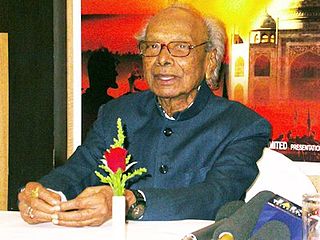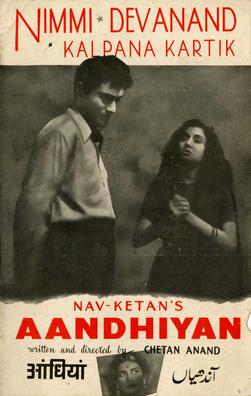Related Research Articles

Lata Mangeshkar was an Indian playback singer and occasional music composer. She is considered to be one of the greatest and most influential singers of the Indian subcontinent. Her voice was one of the unifying elements of the people of South Asia across borders. Her contribution to the Indian music industry in a career spanning eight decades gained her honorific titles such as the "Queen of Melody", "Nightingale of India", and "Voice of the Millennium".

Naushad Ali was an Indian composer for Hindi films. He is widely considered to be one of the greatest and foremost music directors of the Hindi film industry. He is particularly known for popularising the use of classical music in films.

Mohammed Rafi was an Indian playback singer and musician. He is considered to have been one of the greatest and most influential singers of the Indian subcontinent. Rafi was notable for his versatility and range of voice; his songs varied from fast peppy numbers to patriotic songs, sad numbers to highly romantic songs, qawwalis to ghazals and bhajans to classical songs. He was known for his ability to mould his voice to the persona and style of the actor lip-syncing the song on screen in the movie. He received six Filmfare Awards and one National Film Award. In 1967, he was honored with the Padma Shri award by the Government of India. In 2001, Rafi was honoured with the "Best Singer of the Millennium" title by Hero Honda and Stardust magazine. In 2013, Rafi was voted for the Greatest Voice in Hindi Cinema in the CNN-IBN's poll.
Usha Khanna is an Indian music director in Hindi cinema. She is the third female music director to enter the Hindi film industry, after Jaddan Bai and Saraswati Devi and is one of the most commercially successful music directors in the male dominated music industry. She is most known for songs like “maine rakha hai mohabbat” (Shabnam), “Hum tum say juda ho ke”, “gaa deewane jhoom ke”, "Chhodo kal ki baatein", "Shaayad meri shaadi ka khayal" (Souten), and “tu is tarah Se meri zindagi”. She remained active for more than 3 decades from 1960s to 1980s. She is still active making some music for some movies and television-serials, more than 40 years after her debut as music director in Dil Deke Dekho (1959). She received a Filmfare Award nomination for composing the songs for the huge hit film Souten (1983). She was married to director, producer, lyricist, Sawan Kumar Tak, from whom she separated later on.

Feroz Khan, born Zulfiqar Ali Shah Khan, was an Indian actor, film editor, producer and director, who is best known for his work in Indian cinema. He appeared in over 60 films throughout his career, and became one of Bollywood's popular style icons. Khan is best known for his roles in films such as Arzoo (1965), Aurat (1967), Safar (1970), Mela (1971), Upaasna (1971), Apradh (1972), Khotte Sikkay (1974), Kala Sona (1975), Dharmatma (1975), Nagin (1976), Qurbani (1980) and Welcome (2007). He also directed and acted in films such as Janbaaz (1986), Dayavan (1988), Meet Mere Man Ke (1991), Yalgaar (1992), Prem Aggan (1998), Janasheen (2003). He won the Filmfare Best Supporting Actor Award for Aadmi Aur Insaan in 1970, and was honoured with the Filmfare Lifetime Achievement Award in 2000. He is known as Clint Eastwood of India.

Baiju Bawra is a 1952 Hindi musical romantic drama film directed by Vijay Bhatt. Produced by Prakash Pictures, with story by Ramchandra Thakur and dialogues by Zia Sarhadi, Baiju Bawra was a musical "megahit" which had a mighty run of 100 weeks in the theatres. Bhatt's decision to make a film based on classical music was met with scepticism by the Indian film industry due to its "lack of mass appeal", but the film and music turned out be an "overwhelming success".

Raza Murad is an Indian actor who appears primarily in Hindi films.

Bawre Nain is a 1950 Indian Hindi-language romance film directed by Kidar Nath Sharma. It was produced under the Ambitious Pictures banner at Shree Sound Studios. For the music, Sharma persisted with music director Roshan, in spite of several demands from film distributors to have him removed following his failure as a composer in an earlier film, Neki Aur Badi (1949). The music became popular and is stated to be the reason for the film's success. One of the noteworthy songs that popularised playback singer Mukesh was "Teri Duniya Mein Dil Lagta Nahin", composed in Raga Darbari Kaanada. Bawre Nain is cited as Roshan's "first big hit" as a music composer.
Dard (Pain) is a 1947 Bollywood drama film directed by Abdul Rashid Kardar. The film was produced by Kardar Productions. It was a surprise "musical hit" at the box office as it had an ordinary star cast. Suraiya played the second lead, with Munawwar Sultana as the main heroine. The film was Suraiya's first "big hit", becoming a popular singing star following the success of the film. The hero of the film was Kardar's brother Nusrat (Kardar), who shifted to Pakistan following Partition in 1947, where he acted in a few films.

Hemant Birje is an Indian actor who works primarily in Hindi language films. In 1985, he debuted as Tarzan in Babbar Subhash's Adventures of Tarzan, also starring Kimi Katkar. He has had mixed success in later films. He was a regular actor in Mithun Chakraborty films. In 2005, Birje appeared in Garv: Pride and Honour, starring Salman Khan. He has also appeared in Malayalam and Telugu movies.
The 10th Filmfare Awards were held on 13 June 1963, honoring the best films in Hindi Cinema of the year 1962.
Naunihal is a 1967 Indian Hindi-language drama film directed by Raj Marbros starring Sanjeev Kumar, Balraj Sahni and Indrani Mukherjee in lead roles. The film's music was composed by Madan Mohan, with lyrics by Kaifi Azmi, including the song "Meri Aawaz Suno Pyar ka Raaz Suno" sung by Mohammad Rafi. The song is picturized over the funeral procession of Prime Minister of India, Jawahar Lal Nehru.

Aandhiyan is a 1952 Hindi drama, written and directed by Chetan Anand. The story was written by Chetan Anand and Hameed Butt, based on an actual event in Amritsar. It stars Dev Anand, Kalpana Kartik, Nimmi in lead roles. The music of the film was composed by the classical musician Ali Akbar Khan, with lyrics by Narendra Sharma.
Bulo C Rani was an Indian music director. He was a music director in Bollywood from the 1940s until the 1960s. He scored music for 71 films from 1943–72, including some evergreens like "hame to loot liya mil ke husn waalo ne" and others.
"Kuchh Na Kaho" is a romantic Hindi song from the film 1942: A Love Story. The song was composed by R. D. Burman with lyrics by Javed Akhtar and vocals by Kumar Sanu. It was the swan song of R. D. Burman, released three months after his death. It is composed in the Dadra taal. Ronu Majumdar played the flute. Along with Ek Ladki Ko Dekha from the same movie, the song represented Kumar Sanu's peak as a singer. He also said on interview, this song "kuch na kaho" is used as treatment for cerebral palsy patients.
Asad Bhopali was an Indian Hindustani poet and lyricist. The Encyclopaedia of Hindi Cinema, compiled by Gulzar and Saibal Chatterjee, describes him as one of the "few names that stand out for their contribution to Hindi film lyrics".
C.I.D. 909 is a 1967 Bollywood film starring Feroz Khan & Mumtaz in lead roles. O. P. Nayyar has composed the music for the film.

Raju Bharatan was a journalist and writer on Indian cricket and Bollywood music. He worked for a weekly features magazine, The Illustrated Weekly of India, and an Indian films weekly newspaper, Screen. He also directed The Victory Story (1974), the first full-length Indian cricket documentary.
Sardar Malik was an Indian Hindi film music director and score composer.
Kadambari is a 1976 Bollywood drama film directed by H. K. Verma. The film stars Vijay Arora and Shabana Azmi in lead roles. It was the debut film of playback singer Kavita Krishnamurthy's career.
References
- ↑ Rajadhyaksha, Ashish; Willemen, Paul (1999). Encyclopedia of Indian Cinema. Routledge. ISBN 978-1-135-94318-9.
- ↑ Raj, Ashok (2009). Hero Vol.2. Hay House, Inc. ISBN 978-93-81398-03-6.
- ↑ "So Saal Baad". The Gazette of India . Government of India Press. 611: 178. 25 March 1967.
- ↑ "So Saal Baad". Bollywood Hungama . January 1966. Retrieved 7 November 2020.
- ↑ Indian LP EP Records. Gramophone Company of India. 1970. p. 134.
- ↑ Anantharaman, Ganesh (2008). Bollywood Melodies: A History of the Hindi Film Song. Penguin Books India. p. 73. ISBN 978-0-14-306340-7.
- ↑ Bharatan, Raju (11 May 1987). "Lata's Best?". The Illustrated Weekly of India . The Times Group. p. 53. Retrieved 7 November 2020.
- ↑ "So Saal Baad". Shankar's Weekly . K. Shankar Pillai. 19 March 1967. p. 21.